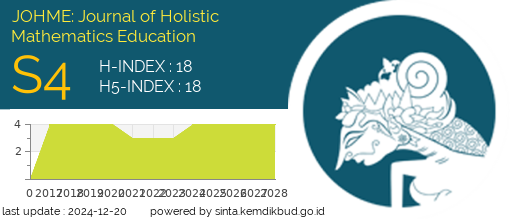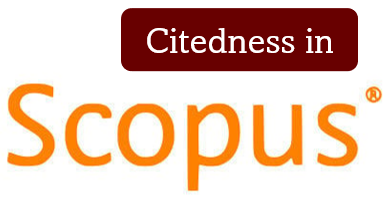PEMECAHAN MASALAH GENERALISASI POLA MATEMATIKA CALON GURU SEKOLAH DASAR DITINJAU DARI GAYA BELAJAR [THE PROBLEM SOLVING OF MATHEMATICAL PATTERN GENERALIZATION BY PROSPECTIVE ELEMENTARY SCHOOL TEACHERS BASED ON LEARNING STYLES]
DOI:
https://doi.org/10.19166/johme.v4i1.2654Keywords:
pemecahan masalah, generalisasi pola, gaya belajar, problem solving, generalization of patterns, learning stylesAbstract
This qualitative research aims to describe the problem solving of pattern generalization in terms of visual, auditory, and kinesthetic learning styles. The subjects in this study were three primary school teacher candidates at the University of Mataram with visual, auditory, and kinesthetic learning styles. Data was collected by giving ELSA learning style tests and pattern generalization tests to the subjects and interviewing the subjects. Data was analyzed using descriptive method and classificationing. The results showed that the research subjects who had a visual learning style were able to perform the problem-solving stages better than the audio and kinesthetic learning styles. This is because the visual learning style likes reading or understanding written instructions which results in the visual learning style being capable of good and orderly coding and processing of information.
BAHASA INDONESIA ABSTRACT: Penelitian kualitatif ini bertujuan untuk mendeskripsikan pemecahan masalah generalisasi pola ditinjau dari gaya belajar visual, auditori dan kinestetik. Subjek pada penelitian ini adalah tiga orang mahasiswa calon guru Universitas Mataram dengan gaya belajar visual, auditori dan kinestetik. Pengambilan data dilakukan dengan cara memberikan tes gaya belajar ELSA dan tes generalisasi pola dan wawancara. Data dianalisis dengan cara deskriptif dan klasifikasi. Hasil penelitian menunjukkan bahwa subjek penelitian yang memiliki gaya belajar visual mampu melakukan tahapan pemecahan masalah yang lebih baik dibandingkan gaya belajar audio dan kinestetik. Hal ini disebabkan karena gaya belajar visual memiliki sifat suka membaca ataupun memahami instruksi secara tertulis yang mengakibatkan gaya belajar visual memiliki sifat mampu melakukan pengkodean dan pemrosesan informasi yang baik dan teratur.
References
Appulembang, O. D. (2017). Profil pemecahan masalah aljabar berpandu pada taksonomi SOLO ditinjau dari gaya kognitif konseptual tempo siswa SMA Negeri 1 Makale Tana Toraja [A profile of guided algebra problem solving using the SOLO taxonomy and the cognitive conceptual tempo style of students at the SMA Negeri 1 School in Makale, Tana Toraja]. Polyglot: Jurnal Ilmiah, 13(2), 47-63. https://doi.org/10.19166/pji.v13i2.336
Barbosa, A., Palhares, P., & Isabel, V. (2012). Pattern tasks: Thinking processes used by 6th grade students. Revista Latinoamericana de Investigación En Matemática Educativa, 15(3), 273-293. Retrieved from http://www.scielo.org.mx/scielo.php?script=sci_arttext&pid=S1665-24362012000300002
Becker, J., & Rivera, F. (2005). Generalization strategies of beginning high school algebra students. Proceedings of the 29th Conference of the International Group for the Psychology of Mathematics Education, 121-128. Melbourne, Australia: University of Melbourne.
Björklund, C., & Pramling, N. (2014). Pattern discernment and pseudo-conceptual development in early childhood mathematics education. International Journal of Early Years Education, 22(1), 89-104. https://doi.org/10.1080/09669760.2013.809657
DeCapua, A., & Wintergerst, A. C. (2005). Assessing and validating a learning styles instrument. System, 33(1), 1-16. https://doi.org/10.1016/j.system.2004.10.003
Demonty, I., Vlassis, J., & Fagnant, A. (2018). Algebraic thinking, pattern activities and knowledge for teaching at the transition between primary and secondary school. Educational Studies in Mathematics, 99(1), 1-19. https://doi.org/10.1007/s10649-018-9820-9
Dunn, R. S., & Griggs, S. A. (2000). Practical approaches to using learning styles in higher education. Westport, CT: Bergin & Garvey.
El Mouhayar, R., & Jurdak, M. (2015). Variation in strategy use across grade level by pattern generalization types. International Journal of Mathematical Education in Science and Technology, 46(4), 553-569. https://doi.org/10.1080/0020739x.2014.985272
Ellis, A. B. (2007). The influence of reasoning with emergent quantities on students’ generalizations. Cognition and Instruction, 25(4), 439-478. https://doi.org/10.1080/07370000701632397
Ellis, A. B. (2011). Generalizing-promoting actions: How classroom collaborations can support students’ mathematical generalizations. Journal for Research in Mathematics Education, 42(4), 308-345. https://doi.org/10.5951/jresematheduc.42.4.0308
Erhardt, R. P. (2014). The process of creating a learning-teaching style assessment: A checklist for documenting observations and teaching strategies 1. Innovative Teaching, 3(1), 1-15. https://doi.org/10.2466/07.it.3.11
Ersoy, E., & Bal-Incebacak, B. (2017). The evaluation of the problem solving in mathematics course according to student views. ITM Web of Conferences, 13, 1-12. https://doi.org/10.1051/itmconf/20171301012
Ferrara, F., & Ferrari, G. (2017). Agency and assemblage in pattern generalisation: A materialist approach to learning. Educational Studies in Mathematics, 94(1), 21-36. https://doi.org/10.1007/s10649-016-9708-5
Ferrara, F., & Sinclair, N. (2016). An early algebra approach to pattern generalisation: Actualising the virtual through words, gestures and toilet paper. Educational Studies in Mathematics, 92(1), 1-19. https://doi.org/10.1007/s10649-015-9674-3
Fleming, N. D. (2001). Teaching and learning styles: VARK Strategies. Christchurch, NZ: Neil D. Fleming.
Garcia Cruz, J. A., & Martinón, A. (1997). Actions and invariant schemata in linear generalizing problems. Proceedings of the 21st Conference of the International Group for the Psychology of Mathematics Education, 289-296. Lahti, Finland: University of Helsinki.
Given, B. K., & Lannen, T. (2000). Learning styles: A guide for teachers and parents. Oceanside, CA: Learning Forum.
Irawan, A., Kencanawaty, G., & Febriyanti, C. (2018). Realistic mathematics and ethnomathematics in improving problem solving abilities. Journal of Physics: Conference Series, 1114(1), 1-5. https://doi.org/10.1088/1742-6596/1114/1/012108
Jagals, D., & Van der Walt, M. (2016). Enabling metacognitive skills for mathematics problem solving: A collective case study of metacognitive reflection and awareness. African Journal of Research in Mathematics, Science and Technology Education, 20(2), 154-164. https://doi.org/10.1080/18117295.2016.1192239
Kirby, J. (1988). Style, Strategy, and Skill in Reading. In R. R. Schmeck (Ed.), Learning strategies and learning styles, 229-274. New York, NY: Springer Science + Business Media.
Krulik, S., & Rudnick, J. A. (1988). Problem solving: A handbook for elementary school teachers. Boston, MA: Allyn and Bacon.
Kusumaningtyas, S. I., Juniati, D., & Lukito, A. (2017). Pemecahan masalah generalisasi pola siswa kelas VII SMP ditinjau dari gaya kognitif field independent dan field dependent. Kreano, Jurnal Matematika Kreatif-Inovatif, 8(1), 76-84. https://doi.org/10.15294/kreano.v8i1.6994
National Council of Teachers of Mathematics. (2000). Principles standards and for school mathematics. Reston, VA: National Council of Teachers of Mathematics.
Peterson, E. R., Rayner, S. G., & Armstrong, S. J. (2009). Researching the psychology of cognitive style and learning style: Is there really a future? Learning and Individual Differences, 19(4), 518-523. https://doi.org/10.1016/j.lindif.2009.06.003
Polya, G. (1971). How to solve it: A new aspect of mathematical method. Princeton, NJ: Princeton University Press.
Presmeg, N. (2009). Editorial. Educational Studies in Mathematics, 70(1), 1-3. https://doi.org/10.1007/s10649-008-9171-z
Pritchard, A. (2009). Ways of learning (2nd ed.). New York, NY: Routledge.
Rayner, S., Roodenburg, J., & Roodenburg, E. (2012). Understanding an integrated theory of intellectual styles: Moving from models to measures and meaning. In L. Zhang, R. J. Sternberg, & S. Rayner (Eds.), Handbook of Intellectual Styles: Preferences in Cognition, Learning, and Thinking, 47-65. New York, NY: Springer Publishing Company.
Reid, G. (2005). Learning styles and inclusion. Thousand Oaks, CA: Sage Publications Inc.
Reiff, J. C., & Cannella, G. S. (1990). Conceptual level, learning style, and beginning teacher performance. Journal of Personnel Evaluation in Education, 3(4), 365-375. https://doi.org/10.1007/bf00126783
Rivera, F. D. (2010). Visual templates in pattern generalization activity. Educational Studies in Mathematics, 73(3), 297-328. https://doi.org/10.1007/s10649-009-9222-0
Simanjuntak, M. F., & Sudibjo, N. (2019). Meningkatkan keterampilan berpikir kritis dan kemampuan memecahkan masalah siswa melalui pembelajaran berbasis masalah [Improving students’ critical thinking skills and problem solving abilities through problem-based learning]. JOHME: Journal of Holistic Mathematics Education, 2(2), 108-118. https://doi.org/10.19166/johme.v2i2.1331
Warren, E., Trigueros, M., & Ursini, S. (2016). Research on the learning and teaching of algebra. In A. Gutiérrez, G. Leder, & P. Boero (Eds.), The Second Handbook of Research on the Psychology of Mathematics Education: The Journey Continues, 73-108. Rotterdam, Netherlands: Sense.
Whitney, B., Dawson, B., & Silbey, G. (2008). California math triumphs volume 5A. Columbus, OH: McGraw-Hill Companies.
Zazkis, R., & Liljedahl, P. (2012). Generalization of patterns: The tension between algebraic thinking and algebraic notation. Educational Studies in Mathematics, 49(3), 379-402. Retrieved from https://link.springer.com/article/10.1023%2FA%3A1020291317178Downloads
Published
How to Cite
Issue
Section
License
Authors who publish with this journal agree to the following terms:
1) Authors retain copyright and grant the journal right of first publication with the work simultaneously licensed under a Creative Commons Attribution License (CC-BY-SA 4.0) that allows others to share the work with an acknowledgement of the work's authorship and initial publication in this journal.
2) Authors are able to enter into separate, additional contractual arrangements for the non-exclusive distribution of the journal's published version of the work (e.g., post it to an institutional repository or publish it in a book), with an acknowledgement of its initial publication in this journal.
3) Authors are permitted and encouraged to post their work online (e.g., in institutional repositories or on their website). The final published PDF should be used and bibliographic details that credit the publication in this journal should be included.”










